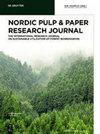Development of fibre properties in mill scale: high- and low consistency refining of thermomechanical pulp (part 2) – Importance of fibre curl
IF 1.2
4区 农林科学
Q3 MATERIALS SCIENCE, PAPER & WOOD
引用次数: 0
Abstract
Increased knowledge on the correlation between pulp processing, fibre-properties and paper properties is required to improve fibre-based products. Part 1 of this investigation deals with the effects of HC and LC refining on fibre properties development. LC refining reduced curl and increased tensile index in a manner similar to hot disintegration whereas HC refining increased curl slightly. In this second part, the correlation between fibre curl and handsheet properties of thermomechanical pulp, subjected to low consistency (LC) refining and hot/cold disintegration is examined. Fibre curl decreased by laboratory disintegration and LC refining and showed a linear correlation with increased tensile index and tensile stiffness. Evaluation of fibre property distributions gave a more detailed description of the development of fibre properties. These revealed that disintegration and LC refining gave different fibre curl versus fibre length distributions, even when their average values were similar. These results confirm that analysing fibre property distributions contributes to a more detailed knowledge of the development of pulp quality. Hot disintegration before laboratory testing exaggerated pulp quality and increase internal fibrillation and can therefore be questioned. When hot disintegration is performed before pulp analyses, the impact of LC refining on paper properties may be misjudged.磨浆机纤维性能的发展:热机械浆的高浓和低浓磨浆(第 2 部分)--纤维卷曲的重要性
要改进纤维产品,就必须进一步了解纸浆加工、纤维特性和纸张特性之间的相互关系。本调查的第一部分涉及高浓磨浆和低浓磨浆对纤维性能发展的影响。低浓磨浆减少了卷曲,增加了抗张指数,其方式与热分解类似,而高浓磨浆则略微增加了卷曲。在第二部分中,研究了经过低浓(LC)磨浆和热/冷崩解的热机械浆的纤维卷曲与手板特性之间的相关性。通过实验室崩解和低浓磨浆,纤维卷曲减少,并与拉伸指数和拉伸刚度的增加呈线性相关。对纤维特性分布的评估更详细地描述了纤维特性的发展。这些结果表明,即使平均值相似,崩解和低浓磨浆也会产生不同的纤维卷曲与纤维长度分布。这些结果证实,分析纤维特性分布有助于更详细地了解纸浆质量的发展。在实验室测试前进行热解会夸大纸浆质量并增加内部纤维化,因此值得商榷。如果在纸浆分析前进行热解,可能会误判低浓磨浆对纸张特性的影响。
本文章由计算机程序翻译,如有差异,请以英文原文为准。
求助全文
约1分钟内获得全文
求助全文
来源期刊

Nordic Pulp & Paper Research Journal
工程技术-材料科学:纸与木材
CiteScore
2.50
自引率
16.70%
发文量
62
审稿时长
1 months
期刊介绍:
Nordic Pulp & Paper Research Journal (NPPRJ) is a peer-reviewed, international scientific journal covering to-date science and technology research in the areas of wood-based biomass:
Pulp and paper: products and processes
Wood constituents: characterization and nanotechnologies
Bio-refining, recovery and energy issues
Utilization of side-streams from pulping processes
Novel fibre-based, sustainable and smart materials.
The editors and the publisher are committed to high quality standards and rapid handling of the peer review and publication processes.
Topics
Cutting-edge topics such as, but not limited to, the following:
Biorefining, energy issues
Wood fibre characterization and nanotechnology
Side-streams and new products from wood pulping processes
Mechanical pulping
Chemical pulping, recovery and bleaching
Paper technology
Paper chemistry and physics
Coating
Paper-ink-interactions
Recycling
Environmental issues.
 求助内容:
求助内容: 应助结果提醒方式:
应助结果提醒方式:


